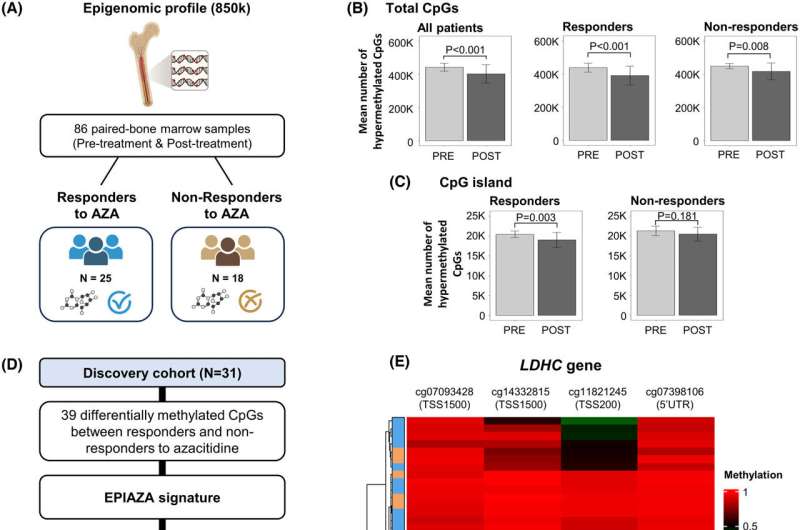This article has been reviewed according to Science X's editorial process and policies. Editors have highlighted the following attributes while ensuring the content's credibility:
fact-checked
trusted source
proofread
Researchers find the key to genome-modifying drugs' sensitivity in malignant blood diseases

There are many anti-cancer genes that are no longer active in human tumors, preventing them from carrying out their protective function against cell transformation. One of the main mechanisms used by cancer cells to silence these 'good' genes is the addition of a chemical modification called methylation, which results in the loss of gene expression.
As this is a simple addition of a single "methyl" group, drugs have been designed to erase this signal, and they have already been approved for use in cancer. These hypomethylating drugs are mainly used in malignant blood diseases such as leukemia.
An article led by Dr. Manel Esteller, Director of the Josep Carreras Leukemia Research Institute (IJC), ICREA Research Professor, and Professor of Genetics at the Faculty of Medicine of the University of Barcelona, published in the British Journal of Haematology, shows how the DNA methylation profiling in common leukemia predicts whether the patient will respond to treatment.
The groups of Dr. Lurdes Zamora, Dr. Blanca Xicoy, and Dr. Francesc Solé from the Josep Carreras Institute, as well as researchers from the Vall d'Hebron Hospital and the University of Bologna, have also collaborated in the study.
"Our research has analyzed nearly 1 million genome methylation signals in patients affected by a type of blood cancer called myelodysplastic syndrome and who have been treated with the demethylating drug."
"We have found an epigenetic 'fingerprint' that is associated with a good clinical response to these drugs, which can help in the early detection of patients who are resistant to demethylating drugs and in the design or administration of alternative treatments," says Dr. Esteller.
Dr. Esteller says they detected general patterns linked to the efficacy of the hypomethylating drug, but also single genes, which could facilitate the development of rapid and relatively inexpensive biomarkers to select responder patients and prepare rescue strategies for the rest.
The researcher adds, "The genes we have found give us clues about the mechanisms involved in hypomethylating agents' sensitivity. Some of them are tumor suppressor genes that now 'wake up' to inhibit tumor proliferation, as expected. In other cases, however, what the genes reactivation by the drug is likely to do is produce proteins (antigens) and other molecules that alert our immune system to fight the disease."
"These data further support the use of cancer immunotherapy, which is likely to work even better in combination with the use of epigenetic drugs, such as the demethylating drugs included in our study."
More information: Aleix Noguera‐Castells et al, DNA methylation profiling of myelodysplastic syndromes and clinical response to azacitidine: A multicentre retrospective study, British Journal of Haematology (2024). DOI: 10.1111/bjh.19392




















